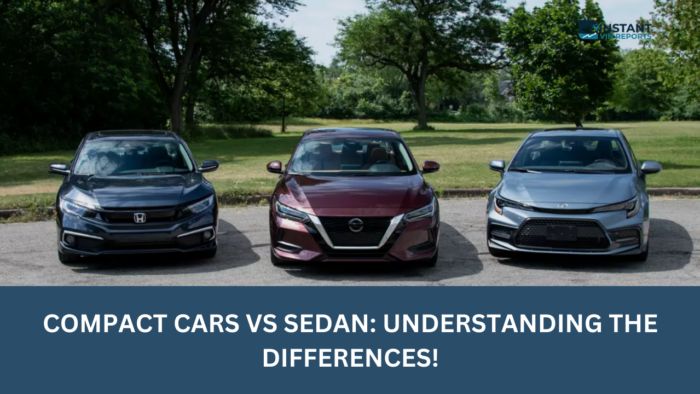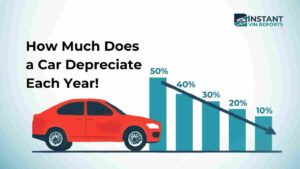When choosing between a compact car vs sedan, it’s essential to understand the key differences that set these two vehicle types apart.
Let’s explore the specifics of each to help you make an informed decision.
Is a Compact car a Sedan?
Yes, a compact car can be a sedan. “Compact” means the car is small in size, and “sedan” means the shape or style of the car. Many compact cars are sedans, but some are hatchbacks too.
A compact car is bigger than a subcompact but smaller than a mid-size car. A sedan has a shape with three parts: the front for the engine, the middle for passengers, and the back for the trunk. It usually has four doors and a fixed roof. A compact sedan is a small-sized car with the shape of a sedan.
What Defines a Compact Car?
A compact car is a practical choice for many drivers, striking a balance between size and maneuverability. Positioned between subcompact and midsize cars, the largest compact vehicles are about 187 inches long.
To be classified as a compact, a car must comfortably seat four passengers and have a combined interior space for passengers and cargo between 100 and 109 cubic feet. These dimensions make compact cars an ideal option for urban driving and parking.
What Defines a Sedan?
Sedans are a familiar sight on the road and are known for their distinctive three-box design. This design features a front section that houses the engine, a middle section for the passenger cabin, and a rear section for the trunk. Sedans comfortably seat at least four people, making them a timeless and classic choice for many car enthusiasts.
Interestingly, the term “sedan” was first used by the Speedwell Motor Company in 1911 to describe one of their models. While early sedans came in both two-door and four-door options, today’s sedans are predominantly associated with having four doors, ensuring easy passenger entry and exit.
The Popularity of Compact Cars
Compact cars remain popular due to their affordability and fuel efficiency. In 2021, compact cars accounted for 8.2% of US sales, down slightly from 9.3% in 2016. Some of the best-selling cars in the US, such as the Toyota Corolla and Honda Civic, fall into the compact category.
If you’re seeking a fuel-efficient car that won’t break the bank on gas, consider the Hyundai Elantra. As a compact sedan, the Elantra is known for its impressive mileage. Its smaller size compared to larger vehicles directly translates to better fuel economy, saving you money at the pump and reducing your environmental impact.
READ ALSO: Top 10 Best Used Midsize Trucks to Buy in 2024
A Compact Car vs Sedan: Key Differences
Now, let’s explore the difference of a compact car and a sedan based on theire difference features.
| Feature | Compact Car | Sedan |
| Size | <187 inches long | >187 inches long |
| Passenger Capacity | 4 people max | 5 people max |
| Cargo Space | No separate compartment | A separate trunk compartment |
| Maneuverability | It is more straightforward to maneuver due to the smaller size | May be slightly less maneuverable due to the larger size |
| Fuel Efficiency | Generally more fuel-efficient due to lighter weight and smaller engine | Can be fuel-efficient depending on the model, but a larger size may impact fuel economy |
| Price | Typically less expensive than sedans | Can vary in price depending on size and features |
| Style | Can come in various styles like hatchback or sedan | Traditionally, a three-box sedan design |
| Examples | Toyota Corolla, Honda Civic, Nissan Versa, Chevrolet Volt, Mazda 3, Ford Fusion, Volkswagen Golf, Fiat Qubo | Toyota Camry, Honda Accord, Nissan Altima, Hyundai Sonata, Kia K5, Subaru Legacy, Volkswagen Jetta, Chevrolet Malibu |
On either side of the compact category are midsize and subcompact cars. Midsize cars are more significant and can seat more than four people, while subcompacts are smaller and offer less space for passengers and cargo. However, there can be some confusion when applying these definitions.
For instance, a luxurious Corvette technically qualifies as a compact car based on the official measurements. But in everyday conversation, most people wouldn’t consider a high-performance sports car like a Corvette to be a compact car. Compact vehicles like sedans, hatchbacks, or SUVs are typically considered more common models.
To speed up your car selection, you can easily compare the features, performances, fuel consumption and more of different compact cars by getting the car window sticker.
Why Choose a Compact Car?
Over the years, compact cars have become increasingly popular, and for good reason discussed below:
Fuel Efficiency
Compact cars typically feature smaller, lighter engines that require less fuel, translating to significant savings at the pump. This is especially beneficial given rising gas prices.
Easy Parking
Their smaller size makes compact cars easier to park, offering a significant advantage in crowded urban areas. No more circling the block for the perfect spot!
Low Maintenance Cost
Generally, smaller engines and simpler designs of compact cars result in less expensive maintenance compared to larger vehicles. You’ll spend less time and money at the mechanic.
Safety-Oriented
Modern compact cars come equipped with safety features like airbags, anti-lock brakes, and traction control. These features help keep you and your passengers protected on the road.
Budget-Friendly
Compact cars are generally more affordable than larger sedans or SUVs. They offer significant savings from the initial purchase price to financing costs and insurance premiums.
Eco-Friendly
Compact cars’ fuel efficiency directly translates to lower emissions, making them a more environmentally friendly option. By choosing a compact car, you’re doing your part to reduce your carbon footprint.
Nimble and Responsive
The smaller size and lighter weight of compact cars make them more maneuverable, allowing for easier handling in tight spaces and on winding roads.
Lower Overall Costs
Compact cars offer a significant financial advantage over the long term due to their fuel efficiency, lower maintenance costs, and affordability.
Effortless Navigation
Their maneuverability makes navigating city streets and parking a breeze. You’ll feel confident behind the wheel, even in tight situations.
Reduced Environmental Impact
Lower emissions from fuel efficiency contribute to cleaner air and a healthier planet. Choosing a compact car allows you to make a positive environmental impact.
Advanced Technology
Modern compact cars are equipped with advanced features like infotainment systems, driver-assistance technology, and connectivity options, keeping you entertained and safe on the road.
Conclusion
In today’s world of ever-increasing gas prices, fuel efficiency reigns supreme. With their smaller, more efficient engines, Sedans and compact cars offer significant savings at the pump compared to larger SUVs and trucks. This translates to real money in your pocket, making every trip a little less costly.
If you’re considering a used compact car, your buying decision can be enhanced by getting the vehicle history report . This ensures you don’t end up buying a ‘total loss’ car or one with hidden damage from accident, flood, fire, or hail.










